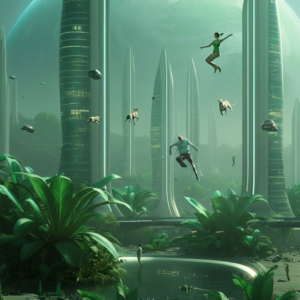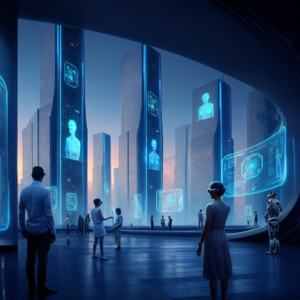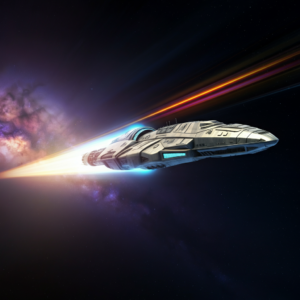The universe we know is vast, cold, and mostly silent. It took nearly 13.8 billion years for Earth to form and life to arise, and even longer for intelligent beings to ask questions about their place in it. But what if that process wasn’t so slow? What if, right from the early days of planetary formation, planets began to evolve rapidly, forming not just solid ground and atmospheres, but the spark of life itself within a few million years?
Imagine a universe where life didn’t have to wait. Planets, instead of being passive recipients of cosmic luck, actively evolved conditions suitable for life, fast. These wouldn’t be ordinary planets; they’d be dynamic, life-ready environments, where biology begins almost as soon as geology settles.
This alternate version of the universe changes everything. From the timeline of evolution to the abundance of intelligent life, the rules are rewritten. Life could be the default instead of the exception.
The Spark: What Would Trigger Fast Planetary Evolution?
In our current reality, several factors must align perfectly for life to begin: the right distance from a star (habitable zone), a stable orbit, protective magnetic fields, water, and carbon-based chemistry. Now imagine a cosmos where these conditions are not rare coincidences but engineered into the very nature of planetary formation.
Here are a few possibilities that could explain this hyper-accelerated planetary evolution:
Hyperactive Chemistry
If early planetary systems had a higher density of organic molecules and catalytic minerals, biochemical reactions could have begun faster. Life might start in days, not eons.
Intelligent Design? Or Universal Laws?
Some theories suggest the universe might be fine-tuned for life. In this alternate possibility, maybe the laws of physics themselves encourage life formation, meaning wherever a planet forms, life is a near guarantee. No need for divine intervention; just natural law leaning toward biology.
Radiant Boost
A different kind of stellar radiation, one that supports complex chemistry without destroying fragile molecules, could bathe these planets in life-giving energy. Think of stars that emit mostly beneficial UV radiation, stimulating molecular bonds instead of breaking them.
Self-Organizing Planets
Perhaps planets themselves behave like complex systems, able to “heal” and adapt to create equilibrium; temperature control, atmosphere generation, even forming oceans internally. These aren’t living planets, but planets that behave as if they want life to thrive.
The Consequences: A Universe Teeming with Life
Let’s say planets evolved rapidly and created life in a matter of millennia. What then?
A Galaxy Full of Civilizations
With billions of planets forming life early and often, intelligent species wouldn’t be rare. Civilizations could rise and fall while Earth was still molten. The Fermi Paradox — “Where is everybody?” — would disappear. They’re everywhere.
The universe becomes more like a cosmic internet of sentient beings, connected or in conflict, exploring and evolving. Galactic politics, diplomacy, and even interplanetary tourism become real possibilities.
Human History Changes
If Earth also evolved this way, humans might have emerged far earlier. Dinosaurs might have never ruled. Or perhaps intelligent life evolved from another lineage entirely; cephalopods, birds, or even fungi. Earth’s history would be wildly different, perhaps skipping the slow crawl from microbes to mammals.
Space Becomes Familiar
Planets wouldn’t just be targets for colonization — they’d be peers. We wouldn’t ask, “Is there life out there?” — we’d know. Astronomers wouldn’t debate questions like “are planets stars?“ because the distinction between planets, stars, and life-supporting bodies would be clearer from the start. We’d grow up knowing Mars hosted life, Titan had its own biosphere, and we’re just one part of a living cosmic ecosystem.
Science Gets Spiritual
If life is everywhere, fast, and inevitable, it changes how we see ourselves. Are we special? Or just one of countless conscious expressions of the universe? Religious and philosophical frameworks would evolve accordingly, perhaps embracing a unified cosmic identity rather than human-centric thinking.
What It Would Mean for Us — Now and in the Future
This “fast life” universe, while imaginary, forces us to reflect on our own. What does it say about the nature of life, intelligence, and the universe’s intent; if any?
We Might Be the Exception
In our world, planets seem slow, life seems rare. If that’s true, we’re either profoundly lucky or there’s something about our cosmos that resists rapid life formation. That makes Earth more fragile, and precious. We are caretakers of a rare miracle.
Or… We’ve Missed the Signs
Maybe the fast life universe isn’t hypothetical at all. Maybe we just haven’t looked closely enough. Life could already be thriving beneath Europa’s icy shell or in the clouds of Venus. Our instruments, biases, or expectations might be hiding the truth.
Our Future: Speeding Up Life Elsewhere
Even if life didn’t evolve fast naturally, humans might make it happen. With advancements in synthetic biology, terraforming, and AI, we could engineer planets to host life in centuries, not millennia. In that sense, we become the agents of the hypothetical, turning a speculative “what if” into tomorrow’s reality.
Conclusion: Possibility is Power
Thinking about what would happen if planets evolved fast and brought life early isn’t just a fun thought experiment. It expands how we view the cosmos, our origins, and our responsibility.
In a universe where life blooms easily, we’re part of a chorus. In one where it doesn’t, we’re the solo voice — and our song matters even more.
Either way, the question reveals what all “what if” explorations aim to do: awaken our imagination and reshape the limits of what we think is possible.






